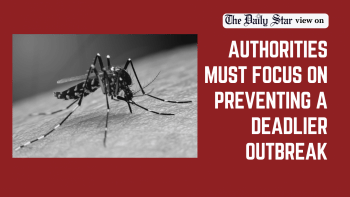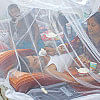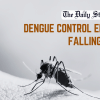Poor dengue response is increasing the risk

The dengue situation seems to be gradually getting out of control amid a lack of proper initiatives by the government. While 27 people died of dengue in August, already 36 people have died in the first 18 days of this month. The infection rate is also steadily increasing, with 865 patients hospitalised in the 24 hours till Wednesday morning. If the city corporations, municipalities, and the health authorities fail to respond properly, we may have another disastrous dengue season this year.
In Dhaka, the anti-mosquito drives have been largely inadequate since the fall of the Awami League regime on August 5. In many areas, workers of the city corporations have been found to be sitting idle, not having the equipment ready to spray insecticides, or are unable to work due to a lack of space to keep spraying equipment. Although the authorities were made aware of the situation, the problem has not been resolved. At the Pallibidyut area of Ashulia, residents have themselves carried out anti-mosquito drives in the absence of official measures. The question is: Why are responsible government institutions failing to perform their duty in this regard? While we understand that the administrative void created in the aftermath of the regime change hampered mosquito control drives, what justification can there be now when administrators have been appointed to properly steer all city corporations and municipalities?
These institutions are supposed to keep their cities and towns clean, and conduct regular mosquito control drives and awareness campaigns. Meanwhile, the health authorities are supposed to hold at least three surveys around the monsoon to learn about the real dengue situation so that area-wise measures can be taken. The pre-monsoon survey was reportedly done in April by the Directorate General of Health Services (DGHS), but there has been no development on the remaining surveys. There is then the question of taking proper action based on survey findings, which is rarely done. Clearly, the authorities have to step up efforts on all fronts to control the dengue situation.
For the city corporations and municipalities, it is vital that they start anti-mosquito drives without delay and with full vigour. They can engage local residents, including students, in their activities including cleaning. As for the DGHS, they should regularly identify dengue hotspots through surveys, and ensure proper hotspot management which is the best way to contain the spread. In addition, the health ministry should be able to provide treatment to all dengue patients in the coming days. Only coordinated efforts from all concerned can contain the disease satisfactorily.

 For all latest news, follow The Daily Star's Google News channel.
For all latest news, follow The Daily Star's Google News channel. 










Comments